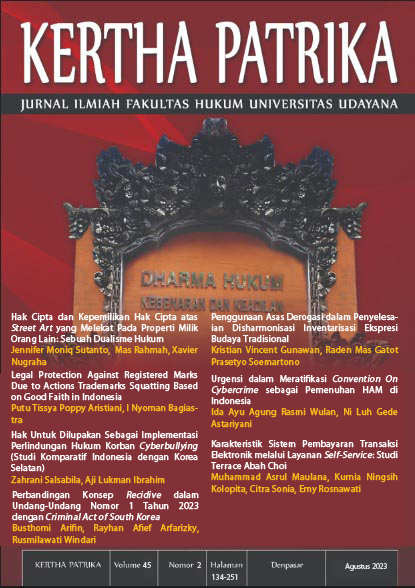Perbandingan Konsep Recidive dalam Undang-Undang Nomor 1 Tahun 2023 dengan Criminal Act of South Korea
Abstract
The purpose of this research is to explore the concept of criminal recidivism between Indonesia and South Korea. The research method employed is normative research using a statute approach, a comparative approach, and a conceptual approach. The research findings reveal that Indonesia and South Korea regulate recidivism with distinct approaches that correspond to the characteristics of each country. In Indonesia, the regulations on recidivism are stipulated in Article 23 of the Indonesian Penal Code, while in South Korea, they are found in Articles 35-36 of the Criminal Act of South Korea. A notable difference is that in South Korea, an individual is considered a recidivist if they repeat a criminal offense that is punishable by imprisonment or a more severe penalty, such as penal servitude or the death penalty. In Indonesia, the aggravation of punishment for recidivism is limited to a one-third increase from the initial penalty, whereas in South Korea, it can be escalated up to twice the initial penalty. Recommendations that can be considered based on the comparison between the two countries include a fair evaluation of recidivism cases, an effective rehabilitation system, a focus on prevention efforts, proportional punishment, as well as enhanced research and monitoring.
Downloads
References
Abdullah, M. & Achmad, R. (1986). Intisari Hukum Pidana. Jakarta: Ghalia Indonesia.
Ali, M. (2011). Dasar-Dasar Hukum Pidana. Jakarta: Sinar Grafika.
Arief, B. N. (2010). Perbandingan Hukum Pidana. Jakarta: Raja Grafindo Persada.
Bawengan, G. W. (1979). Hukum Pidana Dalam Teori dan Praktek. Jakarta: Pradnya Paramita.
Chazawi, A. (2007). Pelajaran Hukum Pidana I. Jakarta: Raja Grafindo Persada.
Chazawi, A. (2011). Pelajaran Hukum Pidana II. Jakarta: Rajawali Pers.
Hamzah, A. (2009). Terminologi Hukum Pidana. Jakarta: Sinar Grafika.
Ibrahim, J. (2005). Teori dan Metodologi Penelitian Hukum Normatif. Malang: Bayumedia Publishing.
Ilyas, A. (2012). Asas-Asas Hukum Pidana. Yogyakarta: Rengkang Education.
Marzuki, P. M. (2010). Penelitian Hukum. Jakarta: Kencana Prenada.
Prasetyo, T. (2012). Hukum Pidana: Edisi Revisi. Jakarta: Rajawali Pers.
Sakidjo, A. & Poernomo, B. (1990). Hukum Pidana: Dasar Aturan Umum Hukum Pidana Kodifikasi. Jakarta: Ghalia Indonesia.
Sudarsono. (2007). Kamus Hukum: Cetakan Kelima. Jakarta: Rineka Cipta.
Jurnal:
Fazel, S. & Wolf, A. (2015). A Systematic Review of Criminal Recidivism Rates Worldwide: Current Difficulties and Recommendations for Best Practice. PLOS ONE, 10(6): 1-8. DOI: https://doi.org/10.1371/journal.pone.0130390.
Hairi, P. J. (2018). Konsep dan Pembaruan Residivisme dalam Hukum Pidana di Indonesia. Jurnal Negara Hukum, 9(2): 199-216. DOI: https://dx.doi.org/10.22212/ jnh.v9i2.1048.
World Wide Web:
KBBI (Kamus Besar Bahasa Indonesia) Daring. Tesaurus -re.si.di.vis.me-. Available from https://kbbi.kemdikbud.go.id/entri/residivisme, diakses 25 Maret 2023.
Peraturan Perundang-Undangan:
Undang-Undang Nomor 1 Tahun 2023 tentang Kitab Undang-Undang Hukum Pidana.
Criminal Act of South Korea, Act No. 17511.











